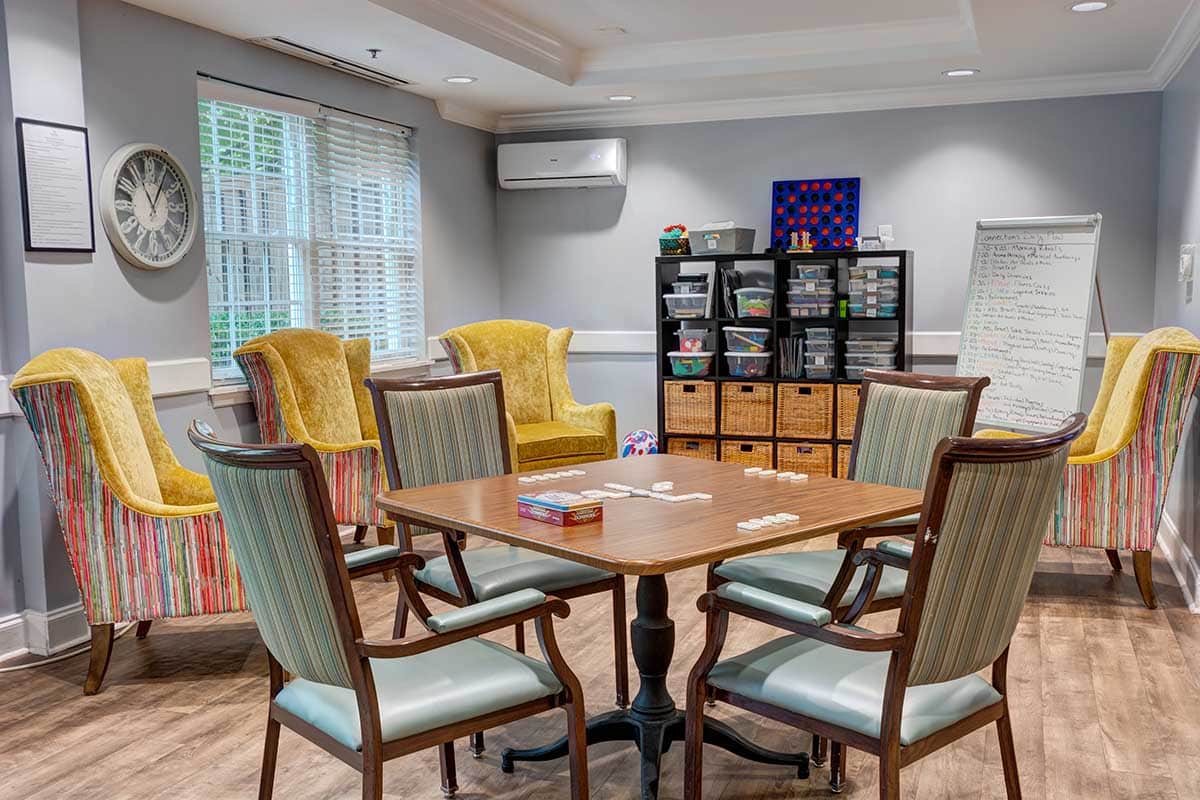Boutique Memory Care Communities That Offer a Homelike Atmosphere
Boutique Memory Care Communities That Offer a Homelike Atmosphere
Blog Article
Everything About Memory Treatment Solutions: Why Little Memory Care Houses Are a Fantastic Choice
Memory treatment solutions play a necessary function in sustaining people with Alzheimer's and mental deterioration. Tiny memory treatment homes attract attention for their customized approach and intimate setting. With reduced staff-to-resident proportions, these homes cultivate stronger links and tailored treatment. Citizens gain from boosted social interactions and a secure atmosphere. As families explore options, recognizing the one-of-a-kind benefits of small memory treatment homes ends up being vital. What variables should be thought about when choosing the right home?
Recognizing Memory Care Provider
While lots of might be acquainted with general elderly care alternatives, comprehending memory care solutions is necessary for families dealing with the challenges of cognitive decrease. Memory care particularly accommodates individuals with problems such as Alzheimer's condition and other kinds of dementia. These solutions provide an organized setting that focuses on boosting the high quality of life for citizens with specialized treatment and support.Memory care centers are designed to assure security and protection, usually including protected environments to protect against roaming. Trained team participants are available all the time to aid with day-to-day activities, drug management, and personal care. Furthermore, memory care programs often include cognitive excitement activities, customized to involve homeowners and promote mental wellness. Households can profit from comprehending these solutions, as they make it possible for educated choices concerning their liked ones' treatment, guaranteeing that their certain requirements and choices are addressed in a encouraging and thoughtful fashion.
The Benefits of Tiny Memory Treatment Residences
Little memory care homes provide unique advantages that can significantly enhance the quality of life for residents with cognitive impairments. One significant benefit is the intimate environment, which enables for tailored communications among staff and homeowners. This smaller sized setup cultivates purposeful partnerships, reducing sensations of seclusion and stress and anxiety typically experienced by individuals with memory issues.Additionally, the reduced staff-to-resident ratio in little memory care homes enables caregivers to offer more mindful supervision and assistance. This approach not only improves safety and security but also advertises a sense of safety for the residents.Moreover, little memory treatment homes can adapt rapidly to the unique demands and preferences of each homeowner, permitting an extra homelike atmosphere. Such an environment can urge social engagement and engagement in tasks, eventually enriching the everyday experiences of those living with cognitive disabilities.
Personalized Treatment Plans for Citizens
Personalized care strategies are essential in memory care homes, as they deal with the distinct demands and preferences of each citizen. These strategies begin with thorough assessments conducted by knowledgeable professionals, that assess cognitive abilities, case history, and individual rate of interests. This tailored method guarantees that care is not only reliable yet likewise considerate of each person's self-respect and autonomy.Moreover, individualized care strategies are flexible, allowing adjustments as homeowners' demands progress with time. This adaptability cultivates a sense of safety and security and familiarity, which is necessary for individuals living with memory difficulties. Caretakers are trained to execute these strategies consistently, offering support that lines up with the citizens' routines and preferences.Ultimately, personalized treatment strategies enhance the high quality of life for citizens by advertising freedom, health, and involvement, making them a basic facet of memory treatment services in small memory care homes.
Creating a Home-Like Environment
Creating a home-like setting is critical for fostering convenience and experience in memory care setups, as it considerably affects locals' psychological health. Tiny memory care homes often focus on personalized touches, such as cozy color palettes, family members photos, and acquainted furniture setups, which assist homeowners feel extra comfortable. Incorporating components similar to a typical home, like comfortable living spaces and public areas, urges a feeling of belonging.Moreover, utilizing natural light and exterior spaces can improve the environment, promoting leisure and tranquility. Personnel play a substantial function in maintaining this atmosphere by involving with residents in a caring fashion, treating them like family members. Regular tasks, such as food preparation or horticulture, can also contribute to a home-like feel, providing possibilities for locals to get involved in significant experiences. Overall, producing a supporting setting supports cognitive function and emotional security, making it a vital facet of memory treatment solutions.
Boosted Social Communication and Community
Improved social interaction and neighborhood are vital components of memory care services. By cultivating individualized social engagement and producing a family-like ambience, these services promote purposeful connections among residents. Group occasions and tasks even more motivate involvement, aiding people really feel extra consisted of and sustained.
Individualized Social Involvement
While social interaction is vital for general well-being, many people with memory impairments often struggle to involve meaningfully with others. Customized social interaction in memory treatment homes addresses this difficulty by creating customized tasks that accommodate locals' distinct interests and abilities. By concentrating on specific choices, caretakers can foster links that reverberate deeply with each person. Activities such as art therapy, music sessions, and led conversations promote cognitive stimulation and psychological expression. Additionally, small team setups motivate friendship and permit more intimate communications, improving sensations of belonging. This approach not only combats sensations of isolation however likewise encourages locals to keep a feeling of identification, ultimately adding to improved mental health and wellness and quality of life.
Family-like Ambience
In a memory care setup, cultivating a family-like environment substantially boosts social interaction and constructs a sense of community among homeowners. Smaller memory treatment homes commonly prioritize intimate settings, enabling locals to create closer links with each other and personnel. This nurturing environment promotes trust fund, which is necessary for people with memory disabilities. Homeowners are much more likely to talk and share experiences, producing an encouraging network that alleviates sensations of solitude. The familiarity of common areas and regimens adds to a sense of belonging, further motivating social interaction (personalized memory care). In such settings, emotional bonds grow, bring about enhanced general well-being and a higher top quality of life for locals as they browse their day-to-day experiences together
Team Activities and Events

Safety and Security Features in Little Houses
Numerous little homes developed for memory care include vital security and protection attributes to ensure the wellness of citizens. These homes usually utilize safe entrance and departure points to avoid wandering, an usual worry among people with memory impairments. In addition, security systems and alarm system mechanisms boost monitoring, guaranteeing that staff can quickly react to any uncommon activities.Interior formats are customized for security, with minimized hazards such as clutter-free paths and sharp edges. Handrails and non-slip flooring are typically installed to lower the threat of falls. Team members are educated in emergency methods, ensuring they are planned for numerous situations.Moreover, personalized treatment strategies may include analysis of individual security demands, providing customized remedies for each local. Generally, these safety and security and safety features produce a nurturing atmosphere where homeowners can thrive while maintaining their self-respect and freedom.
Just how to Pick the Right Memory Treatment Home
Just how can families guarantee they pick one of the most appropriate memory treatment home for their enjoyed ones? The choice requires mindful consideration of a number of factors. Households ought to examine the facility's staff certifications and training, ensuring that caregivers are experienced in managing memory-related conditions. Next off, it's vital to examine the home's setting, focusing on security functions and whether it promotes a sense of community and belonging. Checking out the center can supply insight right into daily activities and the social ambience, which are important for mental excitement and psychological health. Additionally, families ought to ask about the care strategies offered, ensuring they are tailored to private demands. Taking into consideration the home's her latest blog area and ease of access for family sees can add to a smoother change. By attending to these facets, households can make an enlightened decision that prioritizes their liked one's convenience and top quality of life in a memory treatment setup.
Regularly Asked Inquiries
What Certifications Should Personnel Members in Memory Care Houses Have?
Employee in memory treatment homes must possess pertinent accreditations, experience in dementia care, solid communication skills, and empathy. Recurring training in behavioral administration and therapeutic treatments enhances their capacity to sustain citizens properly.
How Do Memory Care Provider Differ From Traditional Assisted Living?
Memory treatment solutions focus specifically on individuals with memory disabilities, supplying customized support and organized settings. In contrast, typical assisted living supplies general assistance with everyday activities, lacking the tailored technique essential for those with cognitive difficulties.
What Types of Tasks Are Used in Memory Treatment Homes?
Memory care homes normally use a range of tasks made to involve homeowners. Usual options include art treatment, songs sessions, cognitive video games, physical workouts, horticulture, and social occasions, all aimed at enhancing wellness and cognitive feature.
Can Citizens Bring Their Own Items to Memory Treatment Homes?
Citizens can normally bring their own belongings to memory treatment homes, enabling them to customize their space - personalized memory care. This method assists produce an acquainted setting, advertising convenience and a feeling of identity for the people

How Are Household Members Included in the Care Refine?
Family participants play an essential role in the treatment procedure, often taking part in decision-making, participating in care meetings, and providing emotional assistance. Their involvement promotes a joint setting, improving the citizen's total well-being and lifestyle. While numerous may be familiar with general elderly care options, comprehending memory treatment solutions is vital for family members facing the obstacles of cognitive decline. These services offer an organized setting that focuses on boosting the top quality of life for residents through specialized care and support.Memory treatment facilities are designed to assure safety and security and safety, often featuring protected atmospheres to avoid wandering. Personalized other treatment plans are vital in memory care homes, as they provide to the distinct requirements and preferences of each homeowner. Team members in memory care homes should possess pertinent accreditations, experience in mental deterioration care, strong communication abilities, and concern. Memory care services focus especially on individuals with memory problems, supplying specific support and organized atmospheres.
Report this page